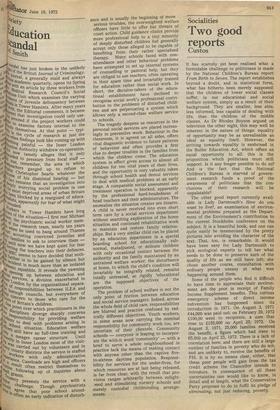Socialities
Two good reports custos
It has scarcely yet been realised what a formidable challenge to politicians is made by the National Children's Bureau report From Birth to Seven. The report establishes beyond a doubt, and in statistical form, what has hitherto been merely supposed: that the children of lower social classes suffer, in our educational and social welfare system, simply as a result of their background. They are smaller, less able, less informed, less capable of dealing with life, than the children of the middle classes. As Dr Rhodes Boyson argued on television the other night, this may well be inherent in the nature of things: equality of opportunity may be as unrealisable an ideal as equality itself. However, the striving towards equality is enshrined in the Butler Education Act, which offers an equal opportunity to all: this is the proposition which politicians must still support. Is it any longer possible to do so? And is the fact that the National Children's Bureau is starved of government research funds a proof of the awareness of politicians that the conclusions of their research will be unpalatable?
The other good report currently available is Lady Dartmouth's How do you want to live?, an examination of environmental problems prepared as the Department of the Environment's contribution to the current Stockholm conference on the subject. It is a beautiful book, and one can quite easily be mesmerised by the pretty pictures into avoiding the character of the text. That, too, is remarkable. It would have been easy for Lady Dartmouth to pick ecological experts to tell her what needs to be done to preserve such of the quality of life as we still have left: she chose another course, consultation with ordinary people uneasy at what was happening around them.
Some of the people who find it difficult to have time to appreciate their environment are the poor in receipt of Family Income Supplement benefits. This curious emergency scheme of direct income subvention has burgeoned since its introduction in 1971. On August 3, 1971 £44,000 was paid out; on February 29, 1972 £100,00 went to recipients, a sum that rose to £155,000 on April 25, 1972. On August 3, 1971, 25,000 families received the benefit, a figure which had risen to 65,000 on April 25, 1972. There is a lack of correlation here; and there are still a large number of families in poverty who do not, and are unlikely to, receive the benefits of FIS. It is by no means clear, either, that these poor people will gain from the tax credit scheme the Chancellor intends to introduce. In consequence of all these uncertainties one would like to know, in detail and at length, what the Conservative Party proposes to do to fulfil its pledge of eliminating, not just reducing, poverty.








































 Previous page
Previous page